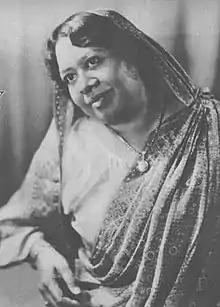Bina Addy
Bina Addy (born 13 Jan 1894, died 1962), also seen as Bini Addy, was an Indian singer of popular Bengali and western songs.
Bina Addy | |
|---|---|
 Bina Addy, from a 1937 Australian magazine. | |
| Born | Calcutta |
| Died | 1962 |
| Nationality | Indian |
| Other names | Bini Addy |
| Occupation | singer |
Early life
Bina Addy was from Calcutta, from a Bengali Christian family; two of her brothers became college professors.[1] Her voice first attracted notice in a church choir in Calcutta. She studied music in Europe after 1928, with Elena Gerhardt in Leipzig and Mario Cotogni in Rome.[2]
Career
Addy was considered a mezzo-soprano or contralto singer.[3][4] She was promoted as the first Indian woman to study Western music in Europe,[5] and the first to become a professional singer touring internationally.[6][7] She performed on BBC radio broadcasts between 1929 and 1932.[8][9] In 1931, the League of Nations Union in Croydon held a reception for Addy, where she performed.[10]
Addy sang in concerts, on radio, and at benefits for the YWCA and other organizations, in Australia and New Zealand in the 1930s.[2][11][12] She was involved in the centenary celebrations in South Australia in 1936.[13] Her programs were mainly Bengali songs, including works by Rabindranath Tagore,[14] but she sometimes included British folk songs, African-American spirituals, Italian arias, and German lieder.[15] She also gave short talks during her programs, about Gandhi, Tagore, and other Indian topics. She was often accompanied by women musicians.[6] "Her technique is assured and well-founded, and with this she associates an impressive sense of style," noted one Australian critic in 1937.[16]
"It is my sincere desire to create a better understanding between my country and other nations," she told an interviewer in 1937, "and if I could feel that I had in any way provided a link between the East and the West, I should be content."[2]
References
- "Education in India; Increasingly Popular Among Wealthy People". News. 9 March 1937. p. 8. Retrieved 24 November 2019 – via Trove.
- "Bina Addy Indian Contralto to Tour A. B. C." The Wireless Weekly (5 February 1937): 67. via Trove
- "Indian Songstress in London; Miss Bina Addy's Work in England". Malaya Tribune. 30 June 1932. p. 10. Retrieved 24 November 2019 – via NewspaperSG.
- Fifield, Christopher (22 November 2017). Ibbs and Tillett: The Rise and Fall of a Musical Empire. Routledge. ISBN 978-1-351-12572-7.
- E. B. (19 January 1931). "An Indian Singer; Miss Bina Addy's Recital at Rutland House". The Guardian. p. 11. Retrieved 24 November 2019 – via Newspapers.com.
- "Miss Bina Addy; 'At Home' in Concert Chamber". Evening Star. 24 June 1936. p. 15. Retrieved 24 November 2019 – via Papers Past.
- "Talented Bengalese Vocalist; Miss Bina Addy at Savoy". Evening Star. 11 July 1936. p. 19. Retrieved 25 November 2019 – via Papers Past.
- "Bina W. Addy (Mezzo-Soprano)". The Radio Times. No. 311. 13 September 1929. p. 42. ISSN 0033-8060. Retrieved 25 November 2019.
- "The Gershom Parkington Quintet". The Radio Times. No. 426. 27 November 1931. p. 70. ISSN 0033-8060. Retrieved 25 November 2019.
- Creighton, Sean (29 August 2018). "The original Croydon Peace Festival: the town's 'peace weeks' in 1930 and 1934". The Croydon Citizen. Retrieved 25 November 2019.
- "Miss Bina Addy; Drawing Room Recital". Otago Daily Times. 20 June 1936. p. 22. Retrieved 24 November 2019 – via Papers Past.
- "Miss Bini Addy, A Bengalese Singer". Auckland Star. 18 May 1936. p. 11. Retrieved 25 November 2019 – via NewspaperArchive.com.
- "Indian Singer Aids our Centenary". Adelaide News. 2 May 1936. p. 1. Retrieved 25 November 2019 – via NewspaperArchive.com.
- "From India; Mezzo-Contralto to Broadcast". The Sydney Morning Herald. 21 January 1937. p. 20. Retrieved 24 November 2019 – via Newspapers.com.
- "Bina Addy to Assist Y. W. C. A. Fund". The Advertiser. 5 May 1937. p. 11. Retrieved 24 November 2019 – via Trove.
- "Recital of Indian Songs". The Courier-Mail. 12 February 1937. p. 15. Retrieved 24 November 2019 – via Trove.